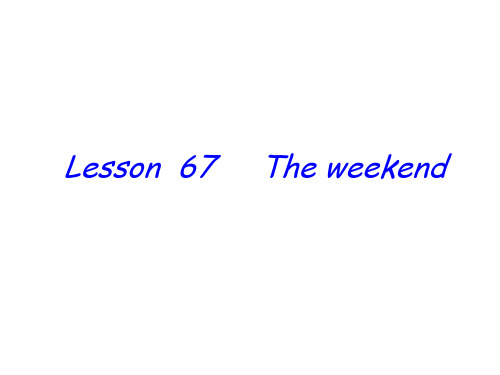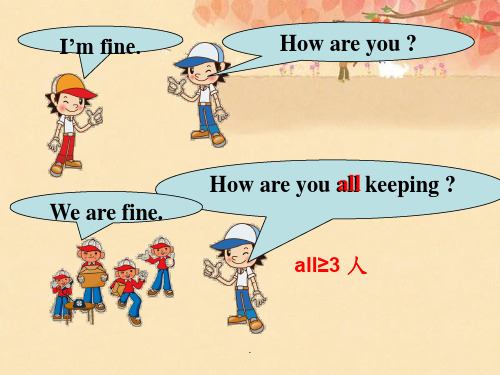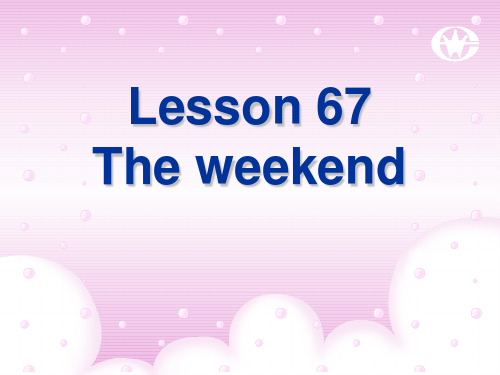新概念英语第一册-L67-the weekend(课堂PPT)
合集下载
新概念第一册67课ppt课件

New words
• absent adj. 缺席的; • be absent from work 旷工 • be absent from school 旷课
采用PP管及配件:根据给水设计图配 置好PP管及配 件,用 管件在 管材垂 直角切 断管材 ,边剪 边旋转 ,以保 证切口 面的圆 度,保 持熔接 部位干 净无污 物
• 修改后:
• We are going to spend three days in the country.
采用PP管及配件:根据给水设计图配 置好PP管及配 件,用 管件在 管材垂 直角切 断管材 ,边剪 边旋转 ,以保 证切口 面的圆 度,保 持熔接 部位干 净无污 物
7
• We are going to say at my mother for the weekday.
1
• Was you at the butcher? • Yes, I were.
采用PP管及配件:根据给水设计图配 置好PP管及配 件,用 管件在 管材垂 直角切 断管材 ,边剪 边旋转 ,以保 证切口 面的圆 度,保 持熔接 部位干 净无污 物
1
• Was you at the butcher? • Yes, I were.
• 修改后: • Were you at the butcher's? • Yes, I was.
采用PP管及配件:根据给水设计图配 置好PP管及配 件,用 管件在 管材垂 直角切 断管材 ,边剪 边旋转 ,以保 证切口 面的圆 度,保 持熔接 部位干 净无污 物
2
• Was you on the butcher's, too? • No, he weren't.
新概念英语第一册Lesson67Lesson70课件

yesterday (morning/afternoon/evening/night) the day before yesterday …ago last … in + 过去的年份
动词过去式 V-ed
★ 一般的在动词后加 ed
★ 不规则动词
cleaned
靠记忆
★ 以e字母结尾的动词后加 d
do-did
There were hundreds of people there.
4. Were our friends, Julie and Jack, at the race?
Yes, they were.
5. How many cars were there in the race?
There were twenty cars in the race.
3.在诊所__a_t__t_h_e__d_octor4’s.在肉店___a_t__th_e__b_u_t_cher’s
5.7:07__s_e_v_e_n__p_a_s_t_seven 6. 2:30__h_a_lf__p_a_s_t__tw_ o
7. 2:45a__qu_a_r_t_e_r__t_o__three8. 十月_O__c_to_b__e_r____
He’s very well. 2. Was Jimmy at school last week?
No, he wasn’t.
3. When was he absent from school?
He was absent on Monday, Tuesday, Wednesday and Thursday. 4. Where are the Johnson going to spend the weekend? At Mrs. Johnson’s mother’s, in the country.
动词过去式 V-ed
★ 一般的在动词后加 ed
★ 不规则动词
cleaned
靠记忆
★ 以e字母结尾的动词后加 d
do-did
There were hundreds of people there.
4. Were our friends, Julie and Jack, at the race?
Yes, they were.
5. How many cars were there in the race?
There were twenty cars in the race.
3.在诊所__a_t__t_h_e__d_octor4’s.在肉店___a_t__th_e__b_u_t_cher’s
5.7:07__s_e_v_e_n__p_a_s_t_seven 6. 2:30__h_a_lf__p_a_s_t__tw_ o
7. 2:45a__qu_a_r_t_e_r__t_o__three8. 十月_O__c_to_b__e_r____
He’s very well. 2. Was Jimmy at school last week?
No, he wasn’t.
3. When was he absent from school?
He was absent on Monday, Tuesday, Wednesday and Thursday. 4. Where are the Johnson going to spend the weekend? At Mrs. Johnson’s mother’s, in the country.
Lesson 67-68 The weekend(课件)-新概念英语第一册

如: last... 上一个...... ...ago ......之前 just now 刚刚 yesterday 昨天, the day before yesterday 前天
be动词的过去式
主语/时态 第一人称单数(I) 第三人称单数 (He, She, It)
现在时 am is
过去时 was
at the greengrocer’s
baker
/ˈbeɪkə/ n.
at the baker’s
at the greengrocer's (shop) at the grocer's at the hairdresser's
在蔬菜水果店 在杂货店 在理发店
at the doctor's (office) at my mother's (house)
Tuesday Friday weekend country baker grocer
Wednesday Saturday spend church keep greengrocer
Which one is appearing?
Saturday
absent country
weekend
greengrocer
Where were you on March 3rd? I was at...
Where were you on April 4th? I was...
Where were you on May 5th? I ...
Where was she on June 6th? She was at...
Friday /ˈfraɪdeɪ/
Saturday /ˈsætədeɪ/ Sunday /ˈsʌndeɪ/ weekend /ˌwiːkˈend/
be动词的过去式
主语/时态 第一人称单数(I) 第三人称单数 (He, She, It)
现在时 am is
过去时 was
at the greengrocer’s
baker
/ˈbeɪkə/ n.
at the baker’s
at the greengrocer's (shop) at the grocer's at the hairdresser's
在蔬菜水果店 在杂货店 在理发店
at the doctor's (office) at my mother's (house)
Tuesday Friday weekend country baker grocer
Wednesday Saturday spend church keep greengrocer
Which one is appearing?
Saturday
absent country
weekend
greengrocer
Where were you on March 3rd? I was at...
Where were you on April 4th? I was...
Where were you on May 5th? I ...
Where was she on June 6th? She was at...
Friday /ˈfraɪdeɪ/
Saturday /ˈsætədeɪ/ Sunday /ˈsʌndeɪ/ weekend /ˌwiːkˈend/
新概念一L67-68ppt课件

week?
.
MRS. WILLIAMS: Yes, he was. He was absent on Monday, Tuesday, Wednesday and Thursday. How are you all keeping ?
MRS. JOHNSON: Very well, thank you. We are going to spend three days in the country. We are going to stay at my mother’s for the weekend. MRS. WILLIAMS: Friday, Saturday and Sunday in the country! Aren’t you lucky!
at the grocer’s .
随堂补充资料
1. Monday is after S_u_n_d_a_y____. 2. The ba_k_e_r____ can make nice bread. 3. I’m going to s_pe_n_d____ two days in French. 4. Jill has a temperature. She is a_b_s_e_n_t_ from
.
名词篇
MRS. JOHNSON: Hello. Were you at the butcher’s? MRS. WILLIAMS: Yes, I was.
Were you at the butcher’s, too? MRS. JOHNSON: No, I wasn’t. I was at the
.
综合篇
MRS. JOHNSON: Hello.Were you at thebutcher’s? MRS. WILLIAMS: Yes, I was.
.
MRS. WILLIAMS: Yes, he was. He was absent on Monday, Tuesday, Wednesday and Thursday. How are you all keeping ?
MRS. JOHNSON: Very well, thank you. We are going to spend three days in the country. We are going to stay at my mother’s for the weekend. MRS. WILLIAMS: Friday, Saturday and Sunday in the country! Aren’t you lucky!
at the grocer’s .
随堂补充资料
1. Monday is after S_u_n_d_a_y____. 2. The ba_k_e_r____ can make nice bread. 3. I’m going to s_pe_n_d____ two days in French. 4. Jill has a temperature. She is a_b_s_e_n_t_ from
.
名词篇
MRS. JOHNSON: Hello. Were you at the butcher’s? MRS. WILLIAMS: Yes, I was.
Were you at the butcher’s, too? MRS. JOHNSON: No, I wasn’t. I was at the
.
综合篇
MRS. JOHNSON: Hello.Were you at thebutcher’s? MRS. WILLIAMS: Yes, I was.
新概念英语第一册第67-68课课件(共41张PPT)

in the country!
Aren't you lucky! ✲ 这句话是否定疑问句形式的感叹句,为的是加强语气。 尽管形式上是否定的,但却表示强有力的肯定。
Grammar
语法
一般过去时(simple past tense) :
过去发生的而现在已经结束的动作要用一般过去时。
基本用法:
1、常用来表示过去某一时间所发生的非持续性动作;
Lesson 67 The weekend
Discussion
What did you do on weekend ?
New Words
greengrocer 蔬菜水果零售商
absent
缺席的
keep
处于、保持
spend
度过
weekend 周末
country
乡村、国家
lucky
幸运的
New Words
5、We played(play的过去式) computer games together. 我们在一起玩了电脑游戏。
6、It ran(run的过去式) after a cat yesterday. 它昨天跑着追赶一只猫。
7、They made(make的过去式) a bookcase for Jim. 他们为Jim做了一个书架。
⑥Miss Zhang was ill 2 days ago. 张小姐前两天病了。
Miss Zhang wasn’t ill 2 days ago. 张小姐前两天没有生病。
一般过去时的句型构成形式:
一、含有系动词(be动词——am/is/are)的一般过去时形式:
✿疑问句: Was /Were + 主语 + …?
Aren't you lucky! ✲ 这句话是否定疑问句形式的感叹句,为的是加强语气。 尽管形式上是否定的,但却表示强有力的肯定。
Grammar
语法
一般过去时(simple past tense) :
过去发生的而现在已经结束的动作要用一般过去时。
基本用法:
1、常用来表示过去某一时间所发生的非持续性动作;
Lesson 67 The weekend
Discussion
What did you do on weekend ?
New Words
greengrocer 蔬菜水果零售商
absent
缺席的
keep
处于、保持
spend
度过
weekend 周末
country
乡村、国家
lucky
幸运的
New Words
5、We played(play的过去式) computer games together. 我们在一起玩了电脑游戏。
6、It ran(run的过去式) after a cat yesterday. 它昨天跑着追赶一只猫。
7、They made(make的过去式) a bookcase for Jim. 他们为Jim做了一个书架。
⑥Miss Zhang was ill 2 days ago. 张小姐前两天病了。
Miss Zhang wasn’t ill 2 days ago. 张小姐前两天没有生病。
一般过去时的句型构成形式:
一、含有系动词(be动词——am/is/are)的一般过去时形式:
✿疑问句: Was /Were + 主语 + …?
新概念第一册67课课件

首先列出了主格、宾格、形容词性物主代词、名词性物主代词以及反身代词的对照表,帮助学生复习代词用法。接着,介绍了一系列新词汇,如greengrocer、hairdresser、baker等,以及与这些词汇相关的短语,如at the greengrocer's。此外,还讲解了absent、keep、spend等词汇的用法,并通过例句展示了take表示花费时间的用法。在语法部分,重点讲解了be动词的过去式was和were的用法,包括肯定句、否定句以及一般疑问句的构成。课程最后提供了一段对话练习,内容涉及询问某人过去的位置、某人的健康状况以及周末的计划安排。通过本课的学习,学生可以掌握一系列与周末生活相关的词汇和表达方式,并加深对过去时态的理解和运用。
新概念英语NCE1_lesson67-68(共33页)课件
were的否定weren’t
was 的否定 wasn’t
• How is Jimmy today? • How are you? How is she/he? • How are they?
•
How are you all keeping?问人怎么
样? 也可以说How are you doing?
名词性…的 反身代词
mine
myself
his
himself
hers
herself
its
itself
ours
ourselves
theirs
theirselves
yours
yourselves
New words
• Monday 星期一 • Tuesday 星期二 • Wednesday 星期三 • Thursady 星期四 • Friday 星期五 • Saturday 星期六 • Sunday 星期日
• He was absent in Monday,Tuesday,
Wednesday ,and thurday. from
• We are going to spent three days on the
country. spend
in
• Aren’t you luck!
lucky
Monday Tuesday Wednesday Thursday Friday Saturday Sunday
• How is everything/it going?
•
What’s going on?
那一般我们都怎么回答呢?
• Not bad. • Pretty well. Very well. • Great. • I’m OK.
新概念英语第一册第67-68课课件
be动词的过去式
主语/时态 第一人称单数 ( I) 第三人称单数 (He, She, It) 第二人称单,复数 (You)第一人称、第三人 称复数we/they 现在时 am was is are were 过去时
is------isn’t
am-------am
not are-------aren’t
= How are you ? 用介词on。 keep v. (身体健康)处于(状况)
♣ MRS.JOHNSON:Very well, thank you. We're going to spend
three daysin the country. We're going to stay at my mother's for the weekend. stay: 短暂的居住。 for the weekend: 整个周末这几天 的时间。 at the weekend 强调时间的某一点
✲ well是形容词,表示身体好
♣ MRS.JOHNSON: Was he absent from school last week? last:上一个 week:周 last week:上周
★ MRS.WILLIAMS: Yes, he was. He was absent on Monday, Tuesday, Wednesday and Tuesday. on:表示在星期几 How are you all keeping?
find out: 有了什么,什么有变化 yesterday am----->was is------->was are------>were
一般过去时
定义:表示过去某个时间发生的动作或者存在
新概念一L67-68The weekend课件
I walked to school yesterday. He walked to school yesterday.
单数was,复数were
过去式 无人称、数的变化
句型转换
肯定句变否定句:
肯定句变一般疑问句:
I was in the office last night.
I was in the office last night.
ten to ten
o’clock
to 超过30分
half past
past 不超过30分
what’s the time?
five past seven
fifteen to nine a quarter to nine
five to ten
what’s the time?
P135 写出图上的时间
I was not in the office last night.
Were you in the office last night?
They were in the office just now.
They were in the office just now.
They were not in the office just now. Were they in the office just now?
['mʌndɪ] ['tju:zdɪ]
['wenzdɪ] ['θɜ:zdɪ] ['fraɪdɪ] ['sætədɪ] ['sʌndɪ] ['wi:kend]
n.星期一 n.星期二 n.星期三 n.星期四 n.星期五 n.星期六 n.星期日 n.周末
新概念一册lesson67ppt Sally
• Mrs.Williams:He’s very well,thank you. • Mrs.Johnson:Was he absent from school last week? • Mrs.Williams:Yes,he was. • He was absent on Mon,Tues, • Wed,and thurday. • How are you all keeping?
Find out the mistakes
• • • • •
were Was you at the butcher’s? was Yes,I were. How are Jimmy today? is Was he absent to school last week? How are you all keep? keeping
am,are的过去式是were is的过去式was
were的否定weren’t
was 的否定 wasn’t
• How is Jimmy today? • How are you? How is she/he? • How are they?
• How are you all keeping?问人怎么 样? 也可以说How are you doing? • How is everything/it going? • What’s going on? 那一般我们都怎么回答呢?
• • • •
Where were you on Sunday, August 8th? I was at home . When were you at home ? I was at home on Sunday, August 8th .
Homework
• 单词抄写五英一汉,背诵课文 并抄课文1遍。
- 1、下载文档前请自行甄别文档内容的完整性,平台不提供额外的编辑、内容补充、找答案等附加服务。
- 2、"仅部分预览"的文档,不可在线预览部分如存在完整性等问题,可反馈申请退款(可完整预览的文档不适用该条件!)。
- 3、如文档侵犯您的权益,请联系客服反馈,我们会尽快为您处理(人工客服工作时间:9:00-18:30)。
v. 度过 n. 周末
n. 星期五 n. 星期六
n. 星期日 n. 乡村 adj. 幸运的
17
★ greengrocer [ˈɡri:nɡrəusə] n. 蔬菜水果零售商
在英文中,表示店铺、住宅、公共机构、公共 建筑物以及教堂的名字或某人家时,
名词所有格后常不出现它所修饰的名词: at the greengrocer's
4. 总经理参加了今天下午的会议。
Our General Manager attended the meeting this afternoon.
13
用括号里动词的适当形式填空。
1. He ____r_e_a_d___ (read) that book last week. 2. Last night he __a_r_r_iv__e_d___ (arrive) just in time for the show. 3. Mary _m___a_r_r_ie_d___ (marry) Thomas yesterday. 4. Tom _s_h_o_w__e__d___ (show) us where to sit at the meeting yesterday. 5. Last summer we ____v__is_i_t_e_d_ (visit) Uncle Jack. 6. It ____r_a_i_n_e_d__ (rain) almost every day last month. 7. John __l_ik__e_d_ (like) to play piano when he was in secondary school. 8. Betty __w__o_r_k__e_d__ (work) hard all last year. 9. We __c_h__a_n_g_e_d__ (change) the color of our uniforms last Christmas. 10. Last year Cindy _______b_o__u_g(hbtuy) her mother a pretty watch for her
26
★ spend v. 度过 [spend]
① v. 花(时间等);度过 spend + n./pron. 度过 We are going to spend several days at my
mother’s. 我们要在我妈妈家呆几天。
I want to spend my holiday in the country this weekend.
birthday.
14
New Words
15
greengrocer [ˈɡri:nɡrəusə] absent [ˈæ bsənt] Monday [ˈmʌndi] Tuesday [ˈtju:zdi] Wednesday [ˈwenzdi] Thursday [ˈθə:zdi] keep reengrocer greengrocer’s
/ˈɡri:nɡrəusə/
19
butcher
/butʃə/
butcher’s
20
at the butcher's 在肉店里 at the dentist's 在牙医的诊所 at the hairdresser's 在理发店 at the stationer's 在文具店 at my mother's 在我妈妈家
我花了3个小时来解释这个计划。 It took me 3 hours to explain this plan.
pay [人做主语,人为某物付钱] pay for sth
I paid him for the rent. 我付给他房租
31
★ country [ˈkʌntri]
n. 乡村
① n. 国家;国土;故乡
28
spend 时间/金钱 +(in) doing sth. The manager spent 2 hours(in)
explaining the plan at the meeting. 在会上,经理用两个小时来解释这个计划
29
spend,cost,afford,take,pay的区别
• cost 物做主语,表示物的售价 I bought a new necklace, it costs
morning
yesterday afternoon
evening
the day before yesterday
4
4.与one 连用: morning evening
one day
Monday afternoon
5.与that 连用:
that
morning winter day year
5
6.其他时间状语:
n. 蔬菜水果零售商 adj. 缺席的 n. 星期一 n. 星期二
n. 星期三 n. 星期四 v. (身体健康)处于(状况)
16
spend [spend] weekend [ˌwi:kˈend] Friday [ˈfraidi] Saturday [ˈsæ tədi] Sunday [ˈsʌndi] country [ˈkʌntri] lucky [ˈlʌki]
要特殊记忆。
❖ am/is-was, ❖ go-went, ❖ eat-ate, ❖ buy-bought, ❖ think-thought ❖ teach-taught, ❖ hurt-hurt, ❖ win-won,
are-were, do-did swim-swam, bring-brought, see-saw, fall-fell, break-broke, lose-lost
I prefer country life to life in the city. 乡村生活与城市生活相比,我更喜欢乡村生活。
After nearly thirty years in the city, he’s still country.
他在城里住了将近三十年,可还是土气十足。
33
★ lucky adj. 幸运的
他并非真知道答案——那不过是个侥幸的猜 测。
It’s lucky he’s here. 他碰巧在这儿。
Lucky dog
That’s my destiny.
35
Listen,Read and answer questions
36
Mrs.Johnson
Mrs.Williams
37
1.Was Mrs.Johnson at the butcher’s? 2.Where was she? 3.Who was at the butcher’s?
[ˈlʌki] ① adj. 有好运的,幸运的
She was lucky to get such a well-paid job. 她能得到这样一个报酬优厚的工作真幸运。
34
② adj. 侥幸的,碰巧的
He didn’t really know the answer - it was just a lucky guess.
me 2000 dollars.
我买了一条新项链,花了我2000美元
• afford 人作主语,支付得起,腾出时 间 I can’t afford it.
我付不起。
I can afford one day for you.
我为你能腾出一天时间。
30
take 花时间,但是要用 It takes sb. some time to do sth.
asked
② 浊辅音或元音后面加ed,读[d] cleaned
③ d/t +ed [id]
dusted
10
❖ 2、以不发音的字母e结尾的动词,直 接加d。 hoped,lived, believed
❖ 3、辅音字母加y结尾的单词,要把y变 i加ed studied,worried,
11
5、有些动词不符合上面的规则,需
India, a former British colony, is now a fully independent country.
曾一度为英国殖民地的印度如今已是一个完全独 立的国家。
② n. 乡下,乡村
country表示“农村”时,
前面一定要加定冠词the
32
③ adj. 乡下的;乡村风味的
21
I am going to stay at my mother's this Friday.
这周五我将在我妈妈家住。
They are going to stay at her grandfather's this weekend.
他们这周末要在她爷爷家住。
22
★ absent adj. 缺席的
1)处于
Keep the fire burning.让火一直燃烧。
2) 保住
He would not be able to keep his job.
他保不住自己的工作了。
3)保存,保管
Would you keep my things for me while I’m away?
当我离开的时候,你能为我保管一下我的东西吗?
例如: ❖ They were happy. ❖ We didn’t have breakfast this morning. ❖ He played football. ❖ You did your homework.
9
动词的过去式变化规则
❖ 1、一般的动词后面直接加-ed
① 清辅音后面加ed,读[t]
2
用于一般过去时的时间状语
1.与ago 连用:
a moment
two minutes
